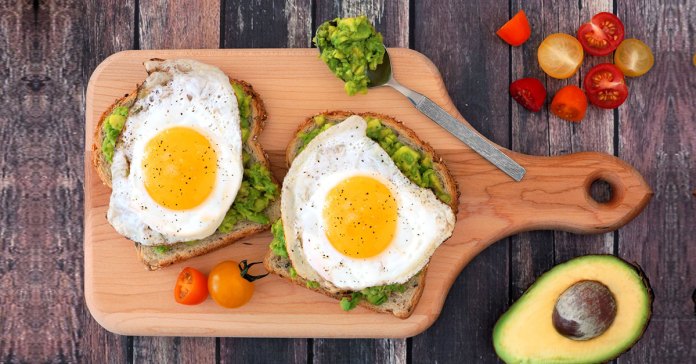The new 2016 dietary guidelines have touted eggs as one of nature’s perfect foods. It provides you with all kind of essential nutrients conveniently packaged in a low-glycemic, affordable and easy to fix food.
It also debunks the common myth that ‘eating eggs raises your cholesterol levels’. The fact is that cholesterol in eggs is dietary cholesterol which contributes only to the ‘good’ cholesterol levels in your body.
This post covers the fundamentals of egg nutrition, clears any confusion about the different types of eggs available in the market. It also makes a case for eggs being part of your healthy eating goals (if you did need convincing!).
It also includes a protein rich egg and avocado combo recipe that contains two of the top super foods for super health!
Debunk Egg Nutrition Myths

Eggs sold at grocery stores come from farms? No. 90% eggs come from massive caged facilities. Cage-free means hens get to go outside? No. They are better than the caged ones, but still kept in cramped spaces. Organic means hens are humanely treated? No. It’s just that they are free of pesticides and fed organic feed. Are brown eggs more nutritious than white ones? No. They are both nutritionally the same.
Read More
The Health Benefits Of Eating Eggs

A single egg delivers 6 grams of protein and vitamins like choline, biotin and B vitamins, all these benefits under 80 calories. Check out the infographic below, to discover all the benefits eggs have to offer.
Read More
Why Eggs Are Nutritionally A Complete Food

Eggs are a rich source of complete, high-quality protein and essential amino acids. These acids are the building blocks of protein which is used to make nearly every tissue and organ – bones, skin, hair, digestive tract, enzymes, blood cells, antibodies, other immune cells. It also contains 14 essential nutrients needed for normal growth, development and repair.
Read More
Are Organic Eggs More Nutritious Than Non-Organic Ones?

Contrary to what many think, there are no nutritional differences between white and brown eggs; quite simply white hens produce white eggs and brown hens produce brown eggs. However, because brown hens are bigger, they eat more and so brown eggs are slightly more expensive to produce than whites are.
Read More
Why Should You Hold On To Those Egg Yolks?

Ironically, most of those nutrients are in the part of the egg most of you have been throwing away – the yolk. The egg yolk consists of fat soluble vitamins A, D, E, and K, B vitamins, and lots of choline. Choline is part of the B-vitamin complex, and is a necessary nutrient that our bodies need, but do not produce enough of on their own. Also, the dietary cholesterol from egg yolks has been found to increase the ‘good’ cholesterol also known as high density lipoprotein or (HDL).
Read More
Can Eating Hard Boiled Eggs Help Burn Excess Fat?

High in nutrients like selenium and riboflavin, eggs are a wholesome and healthy choice for those on a weight loss diet. They are low energy dense foods and a source of lean protein. According to published studies adding 2 eggs to your daily diet does not affect cholesterol levels, but instead provides healthy cholesterol that boosts metabolism.
Read More
Is Dietary Cholesterol In Eggs Really That Unhealthy?

The recommended daily intake of cholesterol is 300 mg, but a single egg contains 212 mg, which is over half of the recommended intake. So, consuming in moderation is not unhealthy. Eggs do not negatively affect blood cholesterol, but in fact balances cholesterol production. It increases HDL more than LDL in the system.
Read More
Should I Stop Eating Eggs To Control Cholesterol?

A recent study suggests that individuals who consume moderate amounts of eggs do not have an increase in cholesterol level. Still moderation is key. If you have high levels of cholesterol, consume fewer than 4-6 eggs per week. Consume them with fiber-rich foods like cruciferous vegetables, whole grain bread, beans as they are shown to lower cholesterol levels.
Read More
How Many Eggs A Day Are Good For Heart Health?

Several health associations have supported the fact that consuming eggs on a daily basis does not increase cholesterol rates or increase heart disease risk. The recommended dose of cholesterol is 300 mg per day where an egg contains only 200 mg. Also it contains protein, vitamin B12, riboflavin, folate and vitamin D which are great for health.
Read More
Eggs And Coffee Are Off The Danger List

New US govt. dietary guidelines have given a green signal for eggs and coffee. It recommends upto 5 cups of coffee everyday as caffeine can help prevent Type 2 diabetes, cardiovascular disease and possibly Parkinson’s disease. It suggests following a Mediterranean diet and limiting processed foods high in saturated and trans fats, added sugars and sodium.
Read More
Protein Rich Egg And Avocado Combo Recipe

This is an exceptional recipe that contains two of the top super foods for super health. Eggs and avocados are two of nature’s top sources of healthy fats. You can make this recipe for breakfast (it makes a great lunch as well) because it combines the best of nutrition: protein, healthy fat, fiber and complex carbs to sail through the morning with energy and without hunger and cravings.
Read More





